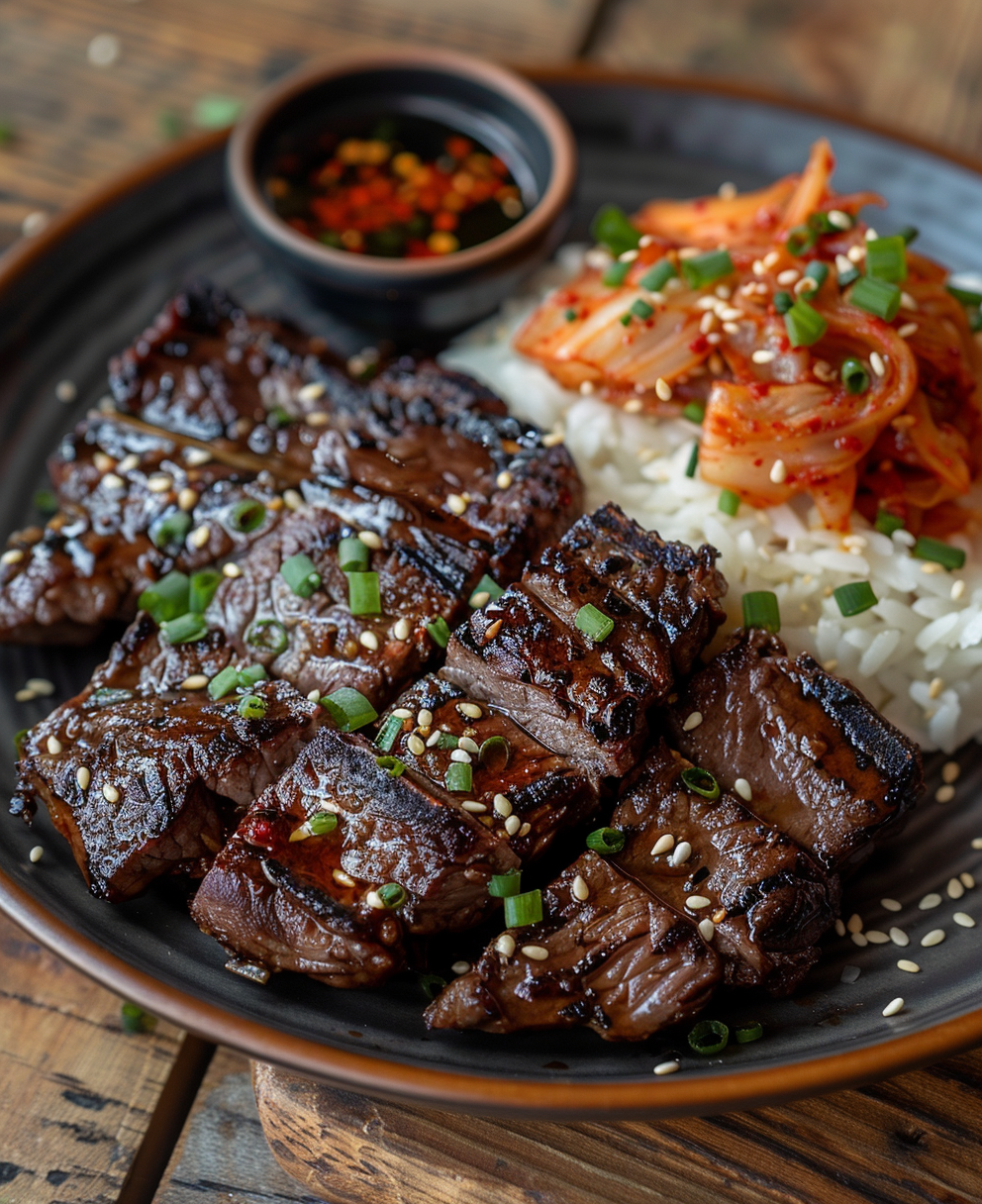
Why Korean BBQ Marinade Makes Every Bite Irresistible
I still remember my first bite of Korean BBQ. The smoky aroma, the tender meat, and that explosion of flavor left me hooked. It wasn’t just the grilling technique—though that helps—it was the marinade. A good Korean BBQ marinade transforms plain cuts of meat into something unforgettable. Whether it’s pork belly, chicken, or beef, this marinade brings out the best in every bite.
What makes it so special? The secret lies in its balance of sweet, savory, and spicy notes. This marinade doesn’t just add flavor; it infuses meat with a depth that’s hard to replicate. And here’s the best part: it’s versatile. You can use it on everything from short ribs to bulgogi-style beef strips. Even if you’re new to cooking Korean dishes, this marinade is your ticket to restaurant-quality meals at home.
What is Korean BBQ Marinade Made Of?
At its core, a classic Korean BBQ marinade relies on a handful of simple ingredients. Each one plays a role in creating that signature taste:
- Soy sauce: Adds saltiness and umami.
- Garlic: Brings a punch of aromatic flavor.
- Sugar or honey: Balances the salt with sweetness.
- Sesame oil: Provides a nutty richness.
But there’s one ingredient that truly sets it apart: gochujang. This fermented chili paste is key to the korean bbq marinade gochujang variation. It adds heat, depth, and a slight tang that elevates the dish. Without it, the marinade wouldn’t have that iconic spicy kick.
The beauty of this marinade is how well-rounded it is. Sweetness from sugar or honey complements the salty soy sauce. Garlic and sesame oil deepen the flavor profile. And gochujang ties it all together with its bold spiciness. Together, these elements create a harmony that works for almost any protein.
Do You Need to Marinate Meat for Korean BBQ?
Yes, marinating is essential for authentic Korean BBQ. It’s not just about flavor—it also tenderizes the meat. A good soak in the marinade ensures every slice absorbs those rich, complex tastes. Skipping this step means missing out on what makes Korean BBQ so delicious.
How long should you marinate different meats? Here’s a quick guide:
- Pork belly: At least 1–2 hours. Overnight works even better for deeper flavor.
- Chicken: 2–4 hours. Chicken absorbs flavors quickly, so don’t overdo it.
- Beef: 30 minutes to 2 hours. Thin slices like bulgogi need less time than thicker cuts.
- Short ribs: Marinate for 4–6 hours. Their denser texture benefits from extra time.
Pro tip: Always pat the meat dry before grilling. This helps achieve that perfect sear while locking in moisture. For convenience, you can also buy pre-made options like a korean bbq marinade bottle from stores like Walmart. They’re great for busy days when you want flavor without the prep work.
If you’re wondering how to marinate meat like KBBQ at home, start with small batches. Experiment with ratios until you find what suits your taste buds. For example, adjust the amount of gochujang if you prefer milder spice levels. Or add extras like grated pear for natural sweetness and tenderizing power.
One of my favorite tricks is using leftover marinade as a sauce. After removing the raw meat, boil the marinade for a few minutes to kill bacteria. Then brush it onto grilled meats for an extra burst of flavor. It’s a simple way to make your meal feel more indulgent.
Why This Marinade Works for Any Occasion
Whether you’re hosting a dinner party or cooking for one, Korean BBQ marinade adapts to any situation. Its versatility shines through no matter the protein you choose. Love pork? Try it with pork belly or ribs. Prefer poultry? Use it on chicken thighs or wings. Beef lovers will enjoy bulgogi-style strips or short ribs.
Even vegetarians can get in on the action. Swap the meat for tofu or mushrooms, and you’ve got a plant-based version that’s just as satisfying. The marinade clings to these alternatives, giving them a savory edge that pairs perfectly with rice or veggies.
Another reason I love this marinade is its accessibility. Most ingredients are easy to find at local grocery stores. If you’re struggling to locate gochujang, check the international aisle or order online. Once you have the basics, you can whip up a batch in minutes.
For those who crave variety, tweak the recipe to suit your mood. Add ginger for warmth, rice vinegar for brightness, or crushed red pepper flakes for extra heat. These small changes keep things exciting without straying too far from tradition.
So next time you fire up the grill—or even the stovetop—try using a Korean BBQ marinade. It’s not just a seasoning; it’s a way to bring people together over shared plates and bold flavors. Trust me, once you taste the difference, you’ll never look back.
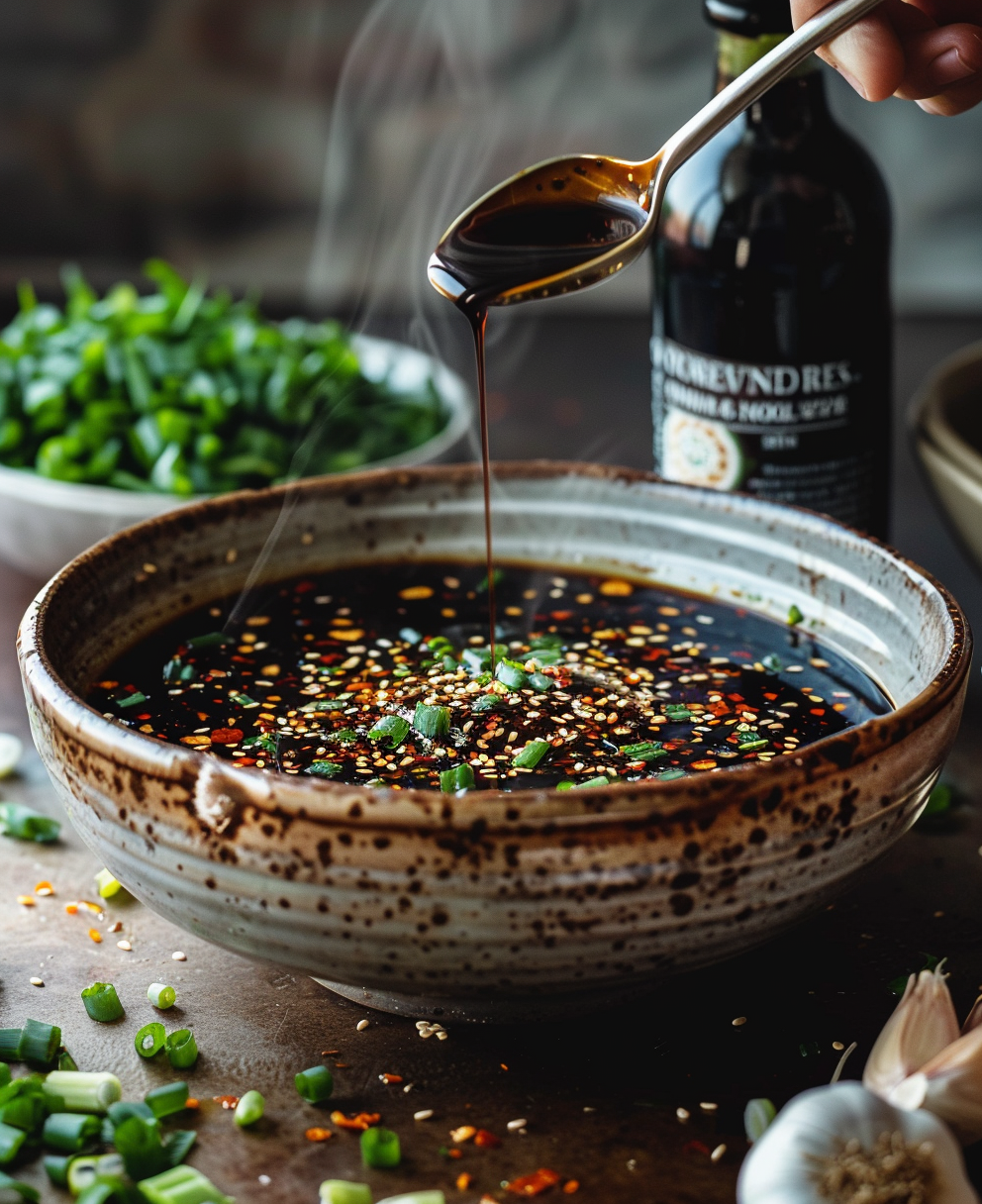
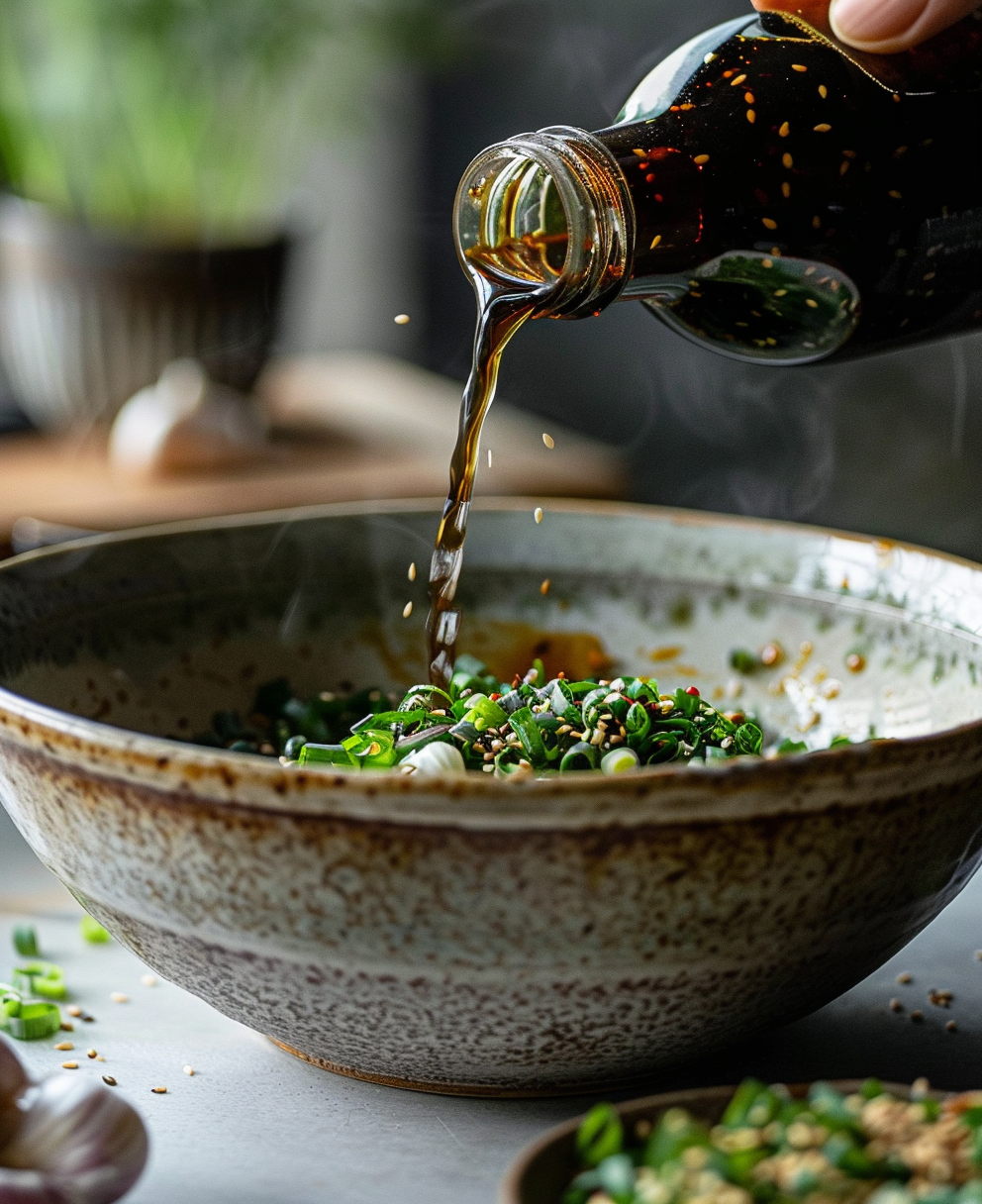
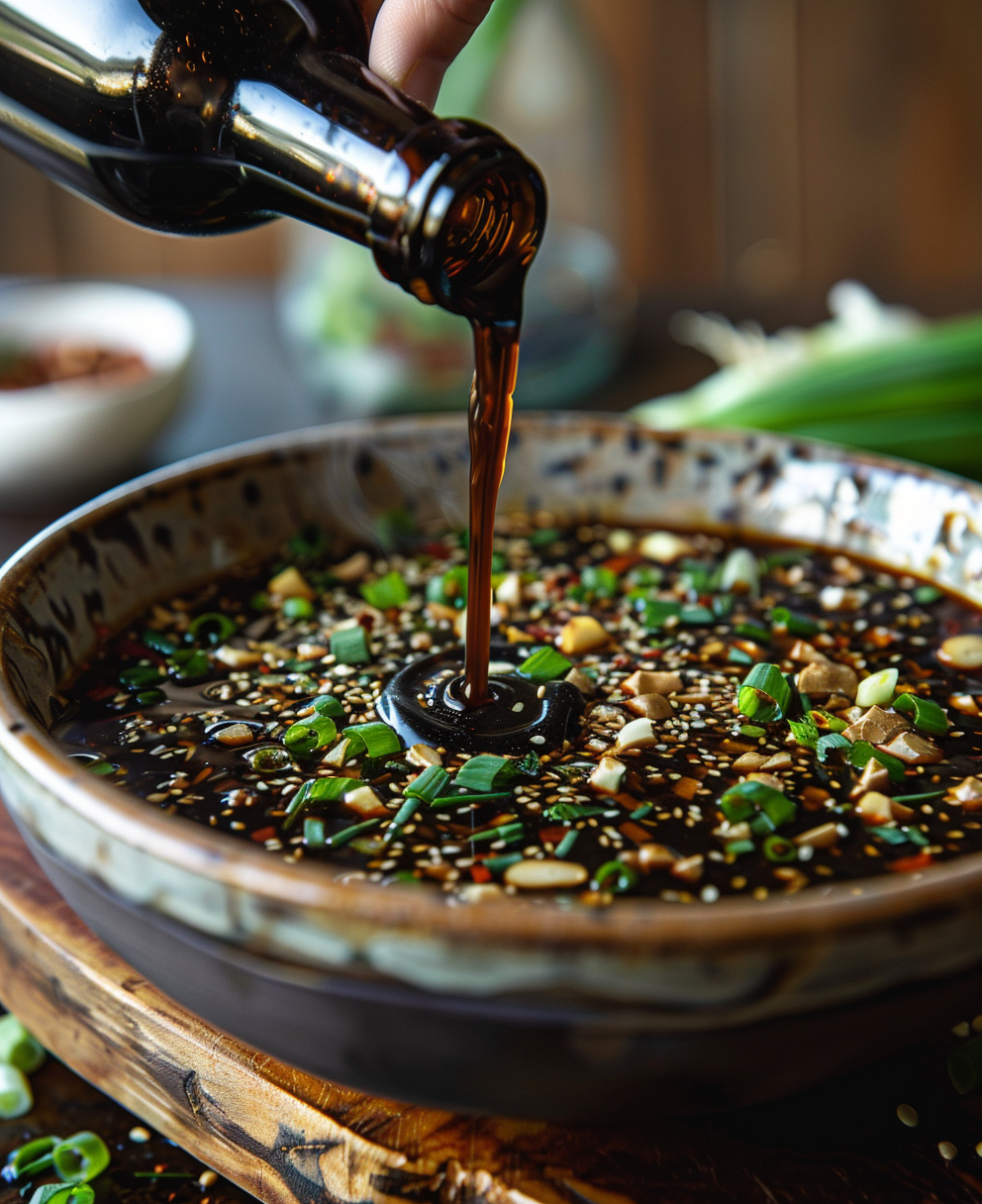
Best Meats to Use with Korean BBQ Marinade
You know what makes Korean BBQ marinade so special? It’s not picky. Seriously, it plays well with just about any protein you throw its way. But some meats really bring out the best in this magical blend of flavors. Let me walk you through my favorites and why they work so well.
Pork Dishes: The King of Korean BBQ
If I had to pick one meat that feels like it was born for Korean BBQ marinade, it’d be pork. Pork belly, or samgyeopsal as it’s called in Korea, is an absolute must-try. Picture this: thick slices of fatty, juicy pork belly sizzling on a grill, coated in a sticky, spicy-sweet marinade. Sounds dreamy, right? That fat renders down while cooking, creating a crispy exterior and tender interior. It’s no wonder this dish is a staple at Korean BBQ joints.
By the way, if you’re into something a little leaner, try making bulgogi-style pork slices. Thinly slice pork shoulder or loin, toss it in your marinade, and let it sit for a couple of hours. Cook it hot and fast on the grill or even in a skillet, and boom—you’ve got yourself a plate of caramelized deliciousness. Funny enough, pork bulgogi reminds me of those baked BBQ pork chops I used to whip up before I discovered Korean flavors. If you’re curious, check out this recipe for baked BBQ pork chops. They’re great, but trust me, once you go Korean BBQ, there’s no turning back.
Oh, and here’s a pro tip: if you’re marinating pork belly, don’t skimp on the time. Overnight is ideal because that fat needs plenty of time to soak up all those bold flavors. Just saying.
Chicken and Beef Options: Versatility at Its Finest
Now, let’s talk chicken. While pork might hog the spotlight (pun intended), chicken holds its own when paired with a good Korean BBQ marinade chicken recipe. Chicken thighs are my go-to—they stay juicy and absorb the marinade beautifully. Drumsticks? Also amazing. Slather them in the marinade, then grill or bake until golden brown. You’ll end up with crispy skin and flavor-packed meat that’s hard to resist.
But wait—what about beef? Oh, beef is where things get fancy. Short ribs, known as galbi in Korean cuisine, are legendary for a reason. Marinate them overnight, then grill them over high heat. The result? Tender, fall-off-the-bone ribs smothered in a rich, savory-sweet glaze. Honestly, I could eat these every day and never get tired of them. For anyone looking to experiment with thinner cuts, try thinly sliced beef for bulgogi. It cooks in minutes and pairs perfectly with rice or lettuce wraps.
Here’s the thing—I recently tried making short ribs using a vinegar-based BBQ sauce I found online (check it out here). While it was tasty, it didn’t quite hit the same notes as a traditional Korean BBQ marinade. There’s just something about the balance of soy sauce, garlic, sesame oil, and gochujang that can’t be beat.
Store-Bought vs. Homemade Marinades
Let’s face it: life gets busy. Sometimes whipping up a homemade Korean BBQ marinade isn’t realistic. That’s where store-bought options come in handy. Grabbing a bottle from Walmart or another grocery store saves time without sacrificing too much flavor. Look for brands that list gochujang as a key ingredient—it’s what gives the marinade its signature kick. Personally, I’ve had decent luck finding quality bottles at Walmart under their house brand (though white BBQ sauce is better left for other recipes).
That said, nothing beats homemade. Sure, it takes a bit more effort, but the freshness and customization are worth it. Plus, you control exactly what goes into it. No weird preservatives or artificial flavors here!
How to Make a Gochujang Marinade
Speaking of homemade, let’s dive into how to make a killer gochujang-based marinade. First off, grab your ingredients—you’ll need soy sauce, garlic, sugar or honey, sesame oil, and, of course, gochujang. Here’s a quick rundown:
- In a mixing bowl, combine ¼ cup soy sauce, 2 tablespoons gochujang, 1 tablespoon honey, and 1 teaspoon sesame oil.
- Grate in a small knob of ginger and crush a couple cloves of garlic. These add brightness and depth.
- For extra tenderness, mix in a tablespoon of grated Asian pear. This trick works wonders, especially for tougher cuts like beef or chicken breast.
- Whisk everything together until smooth. Taste it—if it needs more sweetness, add a drizzle of honey. Want more heat? Throw in a pinch of red pepper flakes.
Once your marinade is ready, toss it with your chosen protein and let it sit. Remember, thin slices like bulgogi only need 30 minutes to an hour, while thicker cuts benefit from longer marination times. And hey, if you’re feeling adventurous, try adding a splash of dinosaur BBQ sauce (find the recipe here) for a fun twist.
One last note: don’t forget to save some marinade for basting or serving as a dipping sauce. Just remember to boil it first to kill any bacteria. Trust me, it’s worth the extra step.
Final Thoughts on Choosing Your Protein
At the end of the day, the beauty of Korean BBQ marinade lies in its adaptability. Whether you’re grilling pork belly, tossing chicken thighs on the stove, or slow-cooking short ribs, this marinade delivers. Even vegetarians can join in by swapping meat for tofu or mushrooms. The possibilities are endless, and honestly, that’s what keeps me coming back to it again and again.
So next time you’re craving bold, vibrant flavors, give this marinade a shot. Experiment with different proteins, tweak the recipe to suit your taste, and enjoy the process. After all, cooking should be as fun as eating—especially when Korean BBQ is involved!
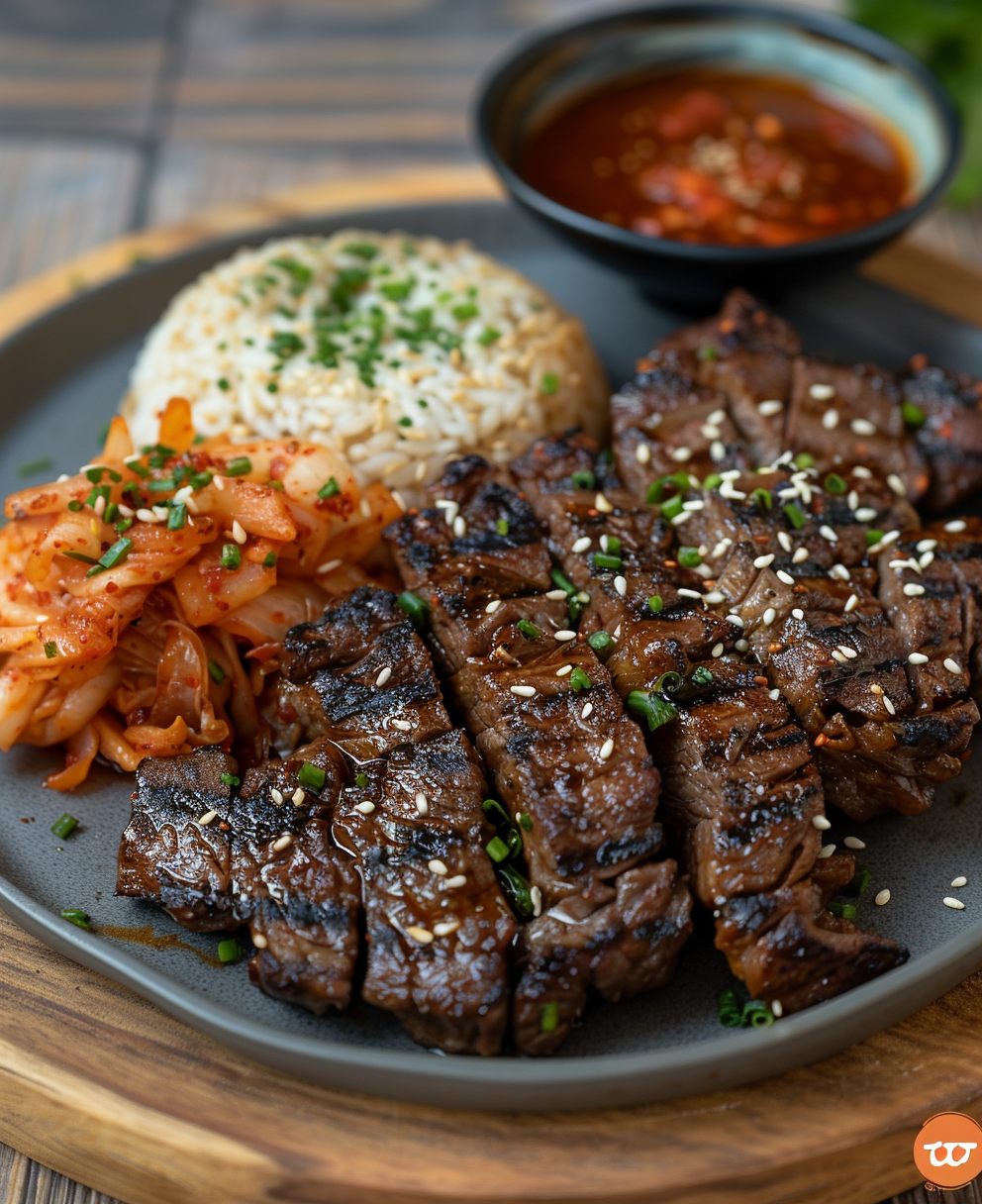
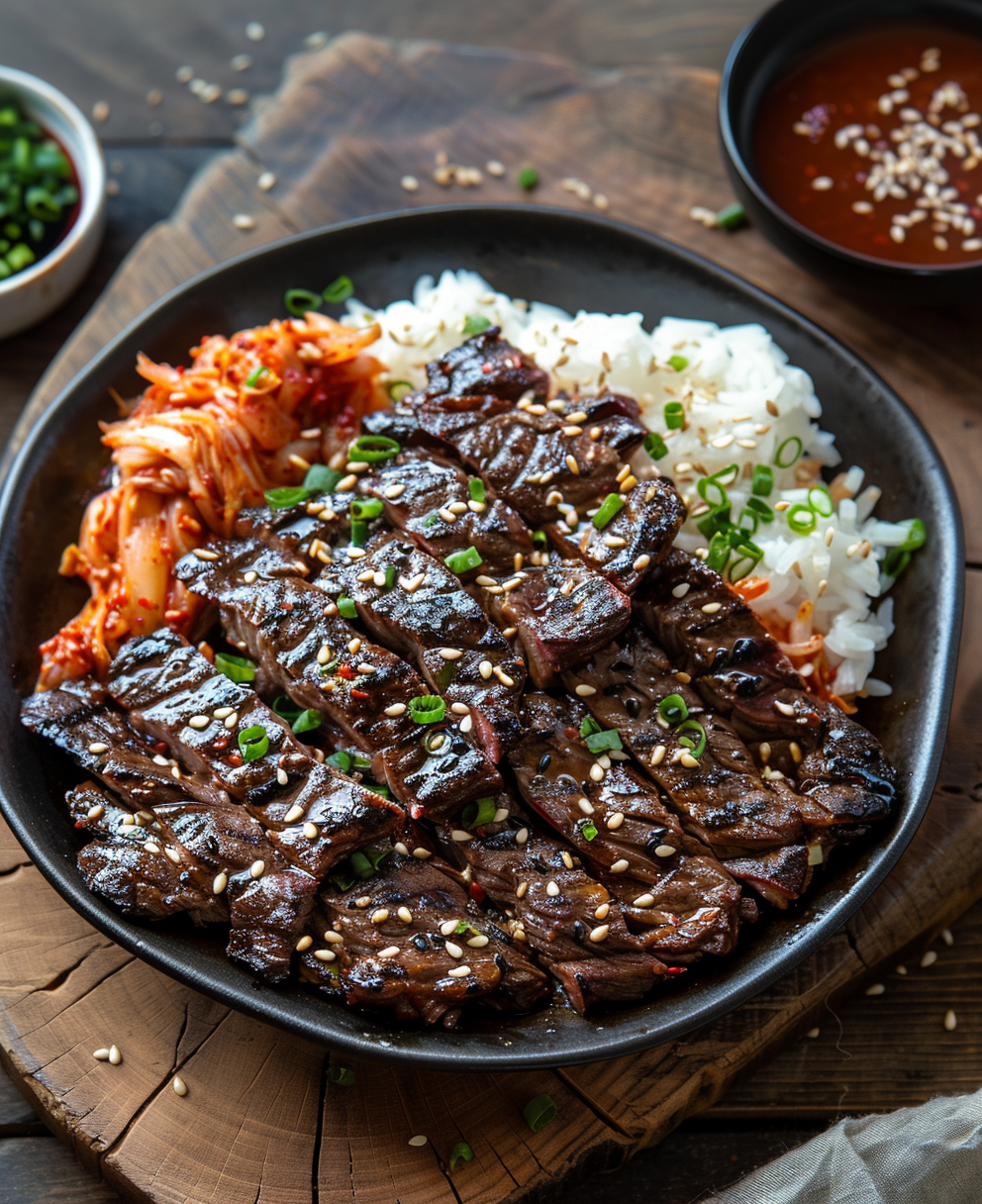
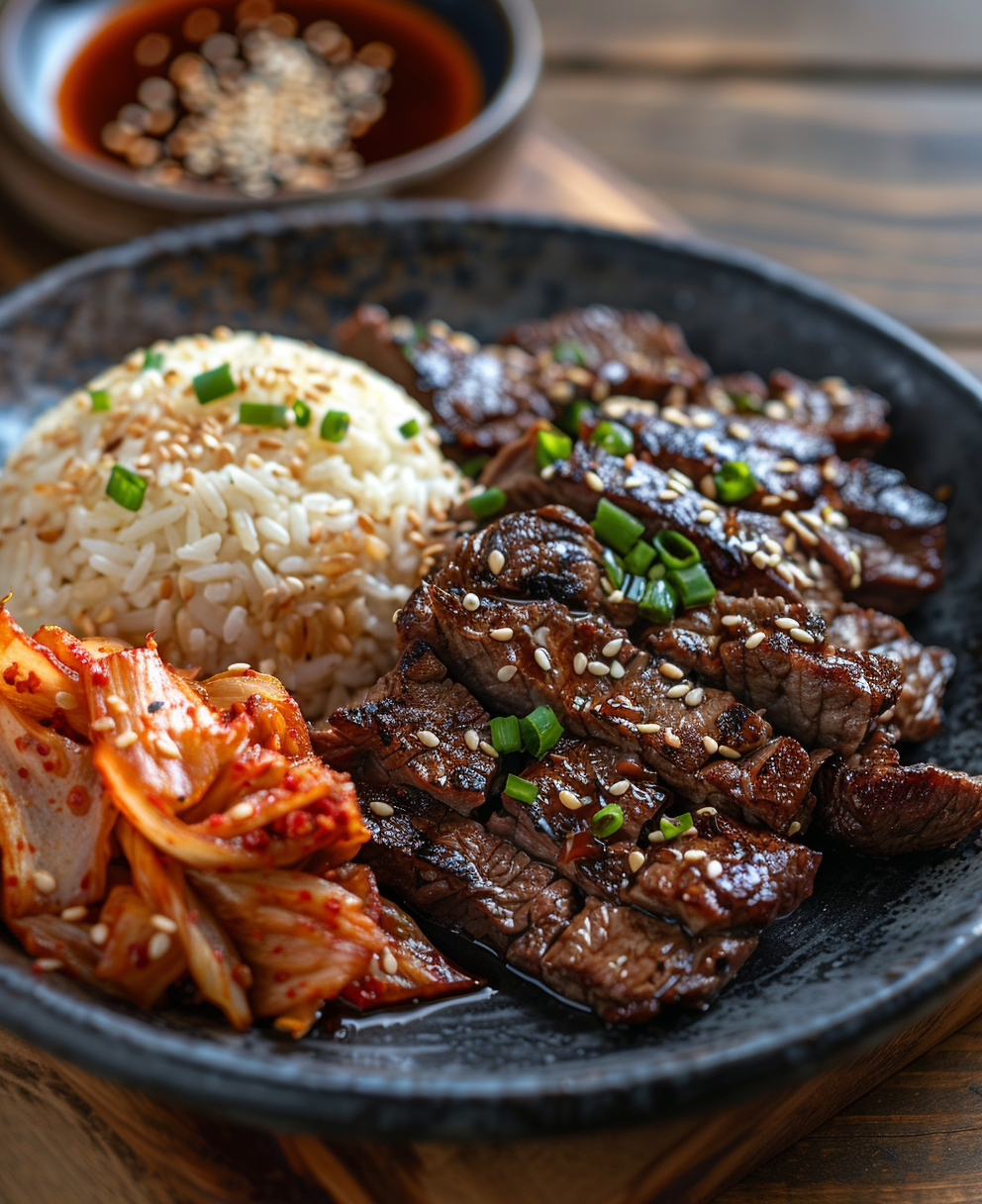
Tips for Perfectly Marinated Meat Like KBBQ
Alright, let’s get into the nitty-gritty of how to nail that perfectly marinated meat like Korean BBQ. You’ve probably already figured out that the marinade is key, but there’s a bit more to it than just slapping some sauce on a slab of meat and calling it a day. Here’s my two cents on making sure your Korean BBQ marinade works its magic every single time.
First things first: slice your meat thin. This isn’t just about aesthetics—it’s about ensuring the marinade can penetrate deeply into the meat. Thin slices mean more surface area, which equals more flavor in every bite. Beef bulgogi or pork belly? Same rule applies. Funny enough, I learned this trick the hard way when I tried marinating a thick steak once. The outside was bursting with flavor, but the inside? Meh. Lesson learned.
Here’s another tip: make sure the marinade coats the meat evenly. Sounds simple, right? But trust me, it’s easy to miss spots if you’re not paying attention. My go-to method is tossing everything in a zip-top bag. Seal it up, squish it around a bit, and let the meat soak in all that goodness. Plus, it’s less messy than bowls, and cleanup is a breeze.
By the way, don’t forget about storage. If you’re prepping ahead of time (which I highly recommend), store your marinated meat in the fridge. A shallow dish works best because it helps the marinade distribute evenly. Oh, and keep it covered—you don’t want any funky fridge smells messing with your masterpiece. For longer storage, you can freeze marinated meat in portions. Just thaw it overnight in the fridge before cooking, and you’re good to go.
Common Mistakes to Avoid
Now, let’s talk about some rookie mistakes that even seasoned cooks sometimes make. First up: over-marinating. Yeah, I know I said marinating is essential, but there’s such a thing as too much of a good thing. Over-marinating—especially with acidic ingredients like vinegar or citrus—can actually start to break down the proteins too much, leaving you with mushy meat. Not ideal. Stick to the recommended times, and you’ll be golden.
Another big no-no? Using too much sugar. Don’t get me wrong, sweetness is a crucial part of the korean bbq marinade flavor profile, but too much can lead to burning. Picture this: you’re grilling those beautiful short ribs, and instead of caramelizing, the sugar turns into a blackened mess. Yikes. Keep the sugar content balanced, and if you’re worried, lower the heat slightly while cooking.
Lastly, adjust the spice levels to suit your taste buds. Gochujang packs a punch, so if you’re not a fan of super-spicy food, start small and work your way up. I remember hosting a dinner party where I went heavy on the gochujang without thinking. Let’s just say my friends were reaching for water more than their forks. Oops.
Frequently Asked Questions About Korean BBQ Marinade
You’ve got questions, and I’ve got answers. Here are some common queries about korean bbq marinade that might help clear things up:
- What is Korean barbecue marinade made of?
It’s a mix of soy sauce, garlic, sugar or honey, sesame oil, and gochujang. These ingredients create a balance of salty, sweet, and spicy flavors that are iconic to Korean cuisine. - Do you need to marinate meat for Korean barbecue?
Absolutely. Marinating ensures the meat absorbs all the flavors while also tenderizing it. Without it, you’d miss out on that rich, complex taste. - How to marinate meat like KBBQ?
Slice the meat thinly, coat it evenly with the marinade, and let it sit for the recommended time. Use a zip-top bag for even distribution and easy cleanup. - How to make a gochujang marinade?
Combine soy sauce, gochujang, garlic, honey, and sesame oil in a bowl. Add grated ginger or Asian pear for extra depth and tenderness. - Can you use korean bbq marinade on chicken?
Yes! Chicken thighs and drumsticks work wonderfully. Marinate for 2–4 hours for juicy, flavorful results. - Where can I buy Korean BBQ marinade?
Check out stores like Walmart or online retailers. Look for bottles with gochujang listed as a key ingredient for authenticity. - How long should you marinate pork belly for Korean BBQ?
Aim for at least 1–2 hours, though overnight yields deeper flavor. Pat the meat dry before grilling for a better sear. - Can vegetarians use Korean BBQ marinade?
Definitely! Try it on tofu or mushrooms for a plant-based twist. The marinade clings well to these alternatives. - What’s the best way to store leftover marinade?
Boil it for a few minutes to kill bacteria, then use it as a basting sauce or dipping sauce during cooking. - Why does my marinade burn during cooking?
Too much sugar or high heat could be the culprits. Reduce the sugar content or lower the cooking temperature to prevent burning.
If you’re looking for more inspiration, check out our BBQ and Grilling recipes. There’s always something new to try!
Here’s the deal: cooking with korean bbq marinade doesn’t have to be intimidating. Whether you’re grilling beef short ribs, tossing chicken on the stovetop, or experimenting with tofu, the possibilities are endless. So grab your ingredients, fire up the grill—or stove—and let the flavors speak for themselves.
And hey, I’d love to hear how it goes! Share your experiences or ask questions—I’m always here to chat about all things delicious. Happy cooking! 🍴

